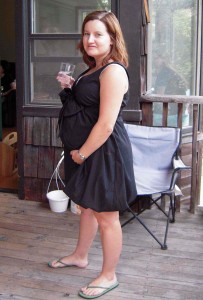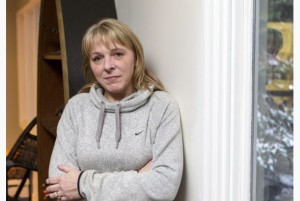In 2008, Listeria in Maple Leaf cold-cuts killed 23 Canadians and sickened another 55.
 An outbreak of listeria in cheese in Quebec in fall 2008 led to 38 hospitalizations, of which 13 were pregnant and gave birth prematurely. Two adults died and there were 13 perinatal deaths.
An outbreak of listeria in cheese in Quebec in fall 2008 led to 38 hospitalizations, of which 13 were pregnant and gave birth prematurely. Two adults died and there were 13 perinatal deaths.
A Sept. 2008 report showed that of the 78 residents of the Canadian province of British Columbia who contracted listeriosis in the past six years, 10 per cent were pregnant women whose infections put them at high risk of miscarriage or stillbirth.
The majority — nearly 60 per cent — of pregnant women diagnosed with listeriosis either miscarry or have stillbirths.
In the April 2010 edition of the journal, Canadian Family Physician, the Motherisk team at the Toronto Hospital for Sick Children published a piece that said, without any references, that “pregnant women need not avoid soft-ripened cheeses or deli meats, so long as they are consumed in moderation and obtained from reputable stores.”
Nonsense.
 Five years later, the hospital has finally decided to take action.
Five years later, the hospital has finally decided to take action.
But not because of bogus advice.
The Hospital for Sick Children has permanently discontinued hair drug and alcohol tests at its embattled Motherisk Drug Testing Laboratory after an internal review “further explored and validated” previous, and as yet undisclosed, “questions and concerns.”
The decision, announced earlier this year, comes amid a Toronto Star investigation and mounting pressure from critics to shutter the lab, whose hair drug and alcohol tests have been used in criminal and child protection cases across the country, typically as evidence of parental substance abuse.
In March, Sick Kids temporarily suspended all non-research operations at Motherisk, after Lang’s review and the hospital’s review revealed new information, pending the results of Lang’s review, which are expected by June 30.
Yesterday, parents who had lost custody of their children or were convicted of crimes as a result of the lab’s results, received some vindication.
Now if they could get their kids back.
 According to a Star editorial, a powerful report made public last week by retired judge Susan Lang found the testing program at the Motherisk lab was “inadequate and unreliable.” As a result, the Ontario government is launching an immediate review of all child custody and criminal cases that may have been adversely affected by false results from the lab.
According to a Star editorial, a powerful report made public last week by retired judge Susan Lang found the testing program at the Motherisk lab was “inadequate and unreliable.” As a result, the Ontario government is launching an immediate review of all child custody and criminal cases that may have been adversely affected by false results from the lab.
The probe is both overdue and very welcome. In the last 10 years hair samples from more than 16,000 people were requested by child protection agencies and the review found six criminal cases that led to convictions where hair tests from the lab were used. No one knows how many parents may have lost custody of their children or how many may have been convicted of a crime based on faulty lab results.
Still, it didn’t have to take so long to resolve — or indeed occur in the first place.
First, Sick Kids could itself have reviewed procedures at the lab when questions were first raised about the accuracy of Motherisk hair strand testing during an October 2014 court case, which overturned evidence from the lab based on expert testimony that its results were unreliable.
Instead, in the face of an investigative series of articles by the Star’s Rachel Mendleson, the hospital went on the defence.
Then, when it did conduct a “review” it got it wrong. In November of last year, CEO Dr. Michael Apkon and pediatrician-in-chief Dr. Denis Daneman announced that an internal probe of Motherisk’s processes “has reaffirmed that the public can have full confidence in the reliability of Motherisk’s hair testing.”
Thankfully, the public and those who lost custody of their kids or were convicted of a crime based on the lab’s “unreliable” results did not have to depend on these two men’s judgment of the program for justice.
Two days later the Ontario government announced Lang’s independent investigation, which found that the lab’s “flawed hair-testing evidence had serious implications for the fairness of child protection and criminal cases.”
There’s more the hospital could have done to prevent this disaster. As Lang found, the hospital could have headed it off in the first place if it had applied lessons around forensic training and oversight from a 2008 inquiry into the actions of the hospital’s former disgraced pathologist, Dr. Charles Smith.
Smith, who served as head pediatric forensic pathologist at the hospital, made errors in hundreds of autopsies before 2001 that resulted in false convictions of several people for killing small children.
In the end, it isn’t just leadership at the Motherisk lab that is on “trial.” It is the people who run one of the country’s most prestigious hospitals.
Prestigious is an adjective thrown around so people don’t ask questions.
If it’s so prestigious, how did they get the Listeria advice so wrong?
